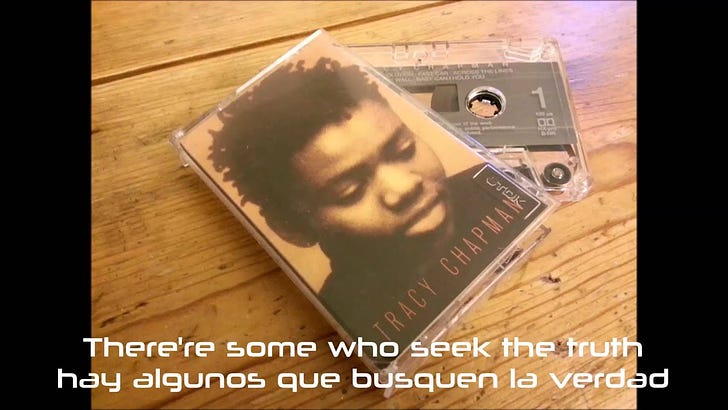Hi all,
Thank you for joining me for today’s song, “Why?”, by Tracy Chapman. If you’d like to hear the song before you read about it, I’ve included a YouTube video below the article.
Below, you’ll find my interpretation of the lyrics (written in italics). Comments and questions are welcome. For Japanese students, vocabulary words in bold are provided in Japanese below. TOEFL (PBT) 450+, Eiken 2, CEFR B1.
A call for change and empathy
( 445 words)
Some of the best songs are ones that ask simple questions. Where Have All the Flowers Gone? and Blowin’ in the Wind come to mind. Today’s song is another like that. It asks some questions that should make us think about our global society and our responsibility toward others living on our shared planet.
The song is by Tracy Chapman. Much of Tracy’s music addresses social issues such as poverty, racism, and injustice. Her lyrics are often deeply touching. She helps explain societal struggles and calls for change and empathy.
The Song
Why do the babies starve / When there's enough food to feed the world
Why, when there's so many of us, / Are there people still alone
Missiles are called "peacekeepers" as an indirect word to describe them as tools for defense and to prevent war. Their purpose is to maintain peace through the threat of force. However, their actual use often contradicts this ideal, causing destruction and conflict.
Why are the missiles called peace keepers / When they're aimed to kill
Women around the world are not always safe. They can experience abuse, rape, and other forms of physical, emotional, or psychological violence even within their own homes.
Why is a woman still not safe / When she's in her home
The chorus of the song might seem strange to anyone who has not read the book 1984 by George Orwell. 1984 depicts an unjust society that is ruled by a totalitarian regime led by Big Brother. It explores themes of surveillance and censorship, following the main character, Winston Smith, and his struggle against the government.
In 1984, the government controls all media. Televisions must remain on all day, every day, because the TVs are actually two-way screens. In this society, people are not allowed to outwardly show any kind of emotion. The phrases “Love is hate”, “War is peace”, and “No is yes” are examples of “doublethink”, or the ability to believe two opposite ideas at the same time. People in Smith’s society believe that if the country is at war, then they will also be at peace.
Love is hate
War is peace
No is yes
And we're all free
But somebody's gonna have to answer (this means someone will have to take responsibility)
The time is coming soon
Amidst all these questions and contradictions / There are some who seek the truth
But somebody's gonna have to answer / The time is coming soon
When the blind remove their blinders / And the speechless speak the truth
The “blind” are the people who refuse to see the injustices. The “speechless” are the people who have not yet taken action (speaking the truth?) to correct the injustices.
Question:
somebody's gonna have to answer
Who do you think “somebody” is?
Vocabulary
injustice 不正
struggle 闘争
empathy 共感
starve 飢える
contradict 矛盾する
totalitarian regime 全体主義政権
surveillance 監視
censorship 検閲
amidst 真っ最中
blind 盲目
blinders 目隠し
Note:
If you’d like to listen to the complete story of 1984, there are several versions on YouTube. You can also read the entire book at https://www.george-orwell.org/1984.
Source
Orwell, G. (2016). Nineteen Eighty-Four: A novel. Berkley.








So many age-old questions that get passed on from generation to generation. Only the details change. It's what sick humans do instead of compromising and sharing, they / we tolerate or rationalize evil.
Tracy Chapman is a legend of political songwriting. Thanks for the chance to listen to and think about the powerful message in this song I hadn’t paid proper attention to for years